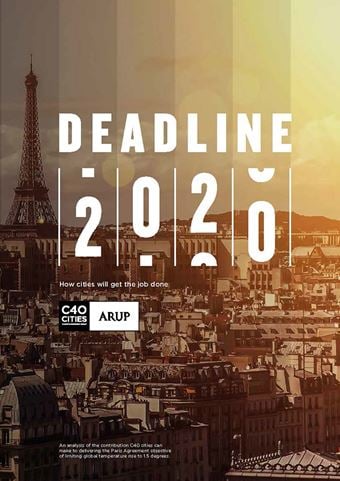The historic agreement made at CoP21 in Paris committed signatories to “holding the increase in the global average temperature to well below 2 degrees, and to pursue efforts to limit the temperature increase to 1.5 degrees.”
What does this mean for Cities?
Deadline 2020: How cities will get the job done provides an analysis of the contribution that the 84 global C40 Cities Climate Leadership Group (C40) cities need to make to convert the agreement from aspiration into reality.
C40 cities need to reduce emissions from an annual average of above 5 tCO2e per citizen today to around 2.9 tCO2e per citizen by 2030. We are short on time. The next four years are critical if we want to halt the growth of emissions. Cities need to be bold and make decisions now, but they cannot do it alone.
Taking action will require approximately $375 billion in investment by national governments and the private sector over the next four years. Sharing this investment will transform and improve entire economies, creating jobs, bolstering infrastructure, and improving public health. Through this action and investment, we have the opportunity to deliver climate-ready cities that are efficient, resilient and liveable.
Deadline 2020 provides concrete steps for cities to meet their part of this objective, offering a roadmap of actions. Key recommendations include:
-
The need to ramp up action
-
Greater opportunity for the buildings and transit sectors
-
Smart urban planning can make all the difference
-
Partnerships and collaboration will be key
The report has been delivered by Arup alongside C40 as part of a collaborative partnership. Together we are developing strategic analysis and research which is central to progressing our understanding of how cities can contribute to climate change mitigation and adaptation.
Deadline 2020 update: April 2018
Arup would like to raise attention to an error in the Deadline 2020: How cities will get the job done report.
The majority of the core recommendations and findings of the work remain valid, and the impact of the error is less significant over the first 10-15 years of projections, which is the focal point for this work.
The C40 Cities Climate Leadership Group (C40) is therefore still encouraging cities, partners and all urban stakeholders to make good use of the work, with the following caution in mind.
The identified issue is around the GDP growth projections that the analysis was based on. This has led to an over-estimation of the "business as usual" emissions trajectories in the report, as well as the long-term absolute savings figures.
We therefore caution that these specific numbers should not be referenced directly. However, the analysis remains useful for its main intended purpose, which is outlining the urgency with which action is needed, and guiding urban policy makers on the level of ambition and key priority areas for climate action in the short term.
C40 and Arup will rectify these numbers in due course, and we are excited to be able to say that a follow up piece of research is underway. Through this work many of the Deadline 2020 numbers will be updated, and a whole raft of methodological enhancements made to further refine their accuracy. This work will be published in 2019.
This issue has not impacted on any C40 climate action planning work undertaken subsequent to the release of Deadline 2020, which has relied on more bespoke emissions baselines.
Thank you and if there are any queries or concerns, please feel free to contact Arup by emailing [email protected]
